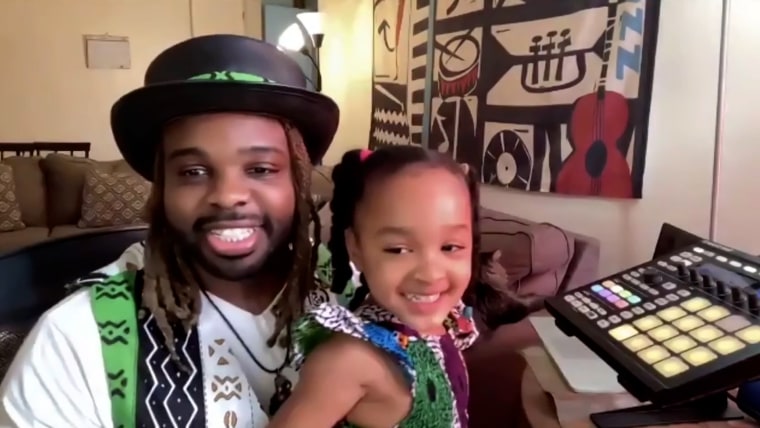Black creators use TikTok to teach forgotten Black history lessons

[ad_1]
When it comes to learning about Black history, students today are tuning in to TikTok for lessons not learned in the classroom.
Well-versed on the basic facts about prominent figures such as Martin Luther King Jr. and Rosa Parks, Gen Zers — or those born roughly from 1997 to 2012, according to Pew Research — are reaching for their phones to consume videos created by a new class of influencers who are committed to picking up the slack in education through entertaining videos featuring forgotten lessons and firsthand stories.
Documenting living history
Shanika Bradshaw has been using her TikTok account to help her 104-year-old grandmother, Madie Scott, tell her own story, including her time working as a sharecropper on cotton farms in Georgia and Florida.
“It was not planned,” Bradshaw told TODAY by email. “One day I was visiting my grandma and I decided to ask her about her past life working in the fields, and she started telling me different things she used to do as a job while working as a sharecropper.”
Bradshaw says when her grandmother began speaking about having to pick cotton from 3 a.m. to 5 p.m. each day, she pulled out her phone and began recording.
“I edited the video some and decided to post it on TikTok,” she explained. “I was shocked to wake up to see over 600,000 people had viewed the video, including Lizzo. That’s when I knew I had a great platform to start sharing many of her life stories with the world so they can hear how hard our elders had to work in the sun for many long hours along with the poor pay to survive.”
The 46-year-old said she did not expect to see her videos connect with so many people, earning her more than 160,000 followers on an app known for lighthearted comedy skits and dancing videos.
“I am surprised so many people love watching and listening to my grandma’s stories,” Bradshaw said. “It’s like they can’t get enough of her!”
Not just ‘Black people issues’
Garrison Hayes, 31, spotlights forgotten books, facts and often untold history lessons. Hayes has built a TikTok following of more than 200,000 people who keep coming back for lessons they wish they learned in school.
“The pandemic pushed me to get into content creation,” Hayes told TODAY by phone. “We were all consuming a ton of content for entertainment to take our mind off of things.”
But Hayes, a diversity, equity and inclusion educator in Nashville, Tennessee, said the content stemming from the Black Lives Matter movement in 2020 inspired him to start posting.
“As the conversation and content on social media began to focus more on race, anti-racism and Black history, I felt something was missing,” he said. “So, I decided to create videos challenging these systems and ideas.”
Hayes says he started posting videos on TikTok to add to the conversation.
In one of his videos, he discusses “The Impending Crisis of the South: How to Meet It,” a self-published book by Hinton Rowan Helper from 1857 that argued the South’s prosperity and cultural development were being held back by slavery, which stunted enterprise. Helper studied cities in the North and South and found that cities in the North had a better quality of life.
“The history of racism in America is one of dividing people who share interests.”
Garrison Hayes, content creator
In the video viewed by more than 600,000 people, Hayes connects the problem with Helper’s book to how racism is still discussed today.
“He almost realized the thing that white supremacy propagandists then and now never wanted for working-class white people to understand,” he says in the clip. “The economic interest of most white people is far more aligned with oppressed Black people and Latino people and Natives than they are with wealthy white people. White supremacy is just a tool to trick white people into economic submission to the interests of the elite.”
Viewers flocked to the video’s comment section to praise Hayes for educating them on a topic they wish they learned earlier.
“They’d never teach this in schools,” wrote one viewer. “Thank you for this! I have a new book to read,” added another.
History isn’t supposed to flatter. It’s supposed to inform. Students should learn that sometimes the greatest of people do things that aren’t so great.
John Gordon, New Jersey public schools teacher
Hayes told TODAY his approach to the conversation around racism makes room for nuance and reframing the discussion as not just “Black people issues.”
“The history of racism in America is one of dividing people who share interests,” he said. “Yes, our history and policies put in place in the past still affect Black people, but they are also affecting other groups as well and I find that missing from the racism conversation. If we don’t address it, we will continue making the same mistakes. We don’t have to be in 2063 still having this conversation.”
‘Everyone can listen, but it’s for us’
While Hayes focuses on forgotten Black history and his belief that it is humanity’s shared responsibility to learn from the past to make a better future, Lynae Vanee aims to inspire Black people to advocate for themselves. Her deftly paced videos use humor to both entertain and educate, earning the full-time content creator an NAACP Image Award nomination and quite a following — including Taraji P. Henson and Billy Porter.
“Everyone can listen, but it’s for us,” the 27-year-old told TODAY. “I’m very inspired by my mom’s side of the family and how their lives were shaped due to the lack of education and access.
“So, I want to reach Black people who may not have had the same access as I did so they can have the knowledge and vocabulary to communicate things they feel and experience but may not have the words or background on the history.”
[ad_2]
Source link

